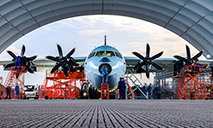Commentary: With great space power comes great responsibility
BEIJING, Dec. 30 (Xinhua) -- A manned spacecraft in orbit experiences a close shave with a satellite appearing out of nowhere. This is no scene from a sci-fi blockbuster, but a real event experienced by China's Tiangong space station in 2021.
The near miss highlighted the need for the U.S. government to oversee the activities of its satellites in humanity's final frontier.
Earlier this month, a letter released by the United Nations Office for Outer Space Affairs revealed that a SpaceX Starlink satellite maneuvered its orbit from 555 km down to 382 km, and in July, it had a close encounter with Tiangong carrying three astronauts. Thankfully, Tiangong narrowly averted disaster, before the incident was replayed in October.
Since the U.S. Federal Communications Commission (FCC), the country's watchdog for satellite services, approved SpaceX's ambitious Internet constellation project, about 1,800 satellites have been put into near-Earth orbits. The private company is aiming to build a 42,000-strong satellite network capable of providing broadband Internet services.
Entrepreneurs are tasked with innovating, and the authorities should be responsible for overseeing.
The United States, as a party of the UN's Outer Space Treaty, bears the responsibility to prevent orbital risks from its satellites throughout their lifespans.
As near-Earth space has become much more crowded than when the treaty was first introduced in the 1960s, extra caution is required to prevent any cosmic disaster.
The United States, a space powerhouse who has long spoken of the threat posed by other countries, has displayed a seeming disregard for the welfare of latecomers.
In April, the FCC greenlighted SpaceX's proposal for its next 2,800 satellites to be launched to an altitude of under 570 km from above 1,100 km in an initial plan, citing that this "will serve the public interest."
The approval was met with strong objections even domestically. Amazon, SpaceX's competitor, worried it would interfere with other satellite networks.
Then came the two uninvited encounters with China's space station.
As Washington is touting its rules-based international order, we should keep in mind that these rules are concerned with protecting more than U.S. interests.
The United States should respect the international order in space based on international law, said Chinese Foreign Ministry spokesperson Zhao Lijian on Tuesday when asked to comment on the events.
The United States strongly advocated "responsible behavior in outer space," but "disregarded its treaty obligations," thus constituting a "typical double standard," said Zhao.
True, the encounters can be considered accidental. But the country's weak oversight is no accident. Its selective application of international rules is likewise a deliberate choice.
In November, a UN panel agreed to create an open-ended working group to avert an arms race in space, deeming it "a major concern among UN member nations." It has been largely ignored by the United States.
As the United States strengthens its Space Force, calling it "a bold, strategic step toward guaranteeing American space dominance," the need for responsible, public-minded action is greater than ever.
Photos
Related Stories
- China sees world's most space launches in 2021
- Yearender: Xinhua's top 10 China news events in 2021
- Children in remote area of SW China’s Sichuan receive special lesson on outer space
- Chinese space rookie Tang Hongbo shares his experience in Tiangong space station
- Chinese taikonaut Wang Yaping's space life
Copyright © 2021 People's Daily Online. All Rights Reserved.










